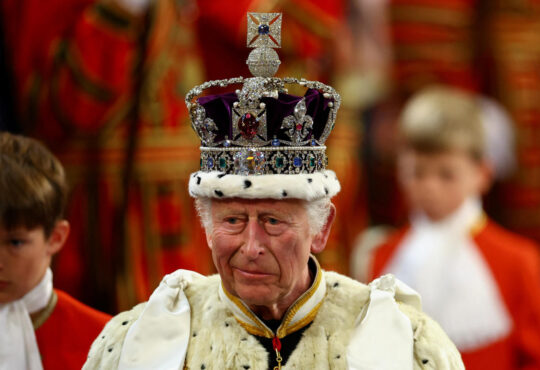
PARIS — France’s Constitutional Council ruled Friday in favor of the most contentious part of President Emmanuel Macron’s pensions reform bill, which raises the legal age of retirement to 64 from 62.
However, it chose to block several other measures, including a “senior index” which aims at encouraging the employment of senior workers. Some of them were added as “sweeteners” to the bill, to make it more acceptable to trade unions and opposition MPs.
“The Constitutional Council examined the application of the articles invoked [by the government], it found that none of the applications have fallen foul of the rules of the National Assembly,” said one of the Council’s officials on Friday.
Following the ruling, Macron signed the measure into law early Saturday morning.
The government had come under fire during parliamentary debates about the reforms, because it had invoked a controversial constitutional maneuver — known as article 49.3 — as well as other moves that curtailed debates in parliament. Macron’s decision to bypass parliament and impose his deeply unpopular pensions reform last month led to a prolonged crisis, with a gridlocked parliament and continued protests.
The ruling is a victory for the French president, who has repeatedly vowed that he would not back down on a reform he promised to push through during his second mandate, but it comes at a cost. It is unlikely to quell the protest movement that has rocked France in recent months. Turnout at the almost weekly demonstrations has been on the wane but some trade unions have warned they will continue protesting the pensions reform.
Boos were heard at a gathering of several thousand protesters in central Paris when the ruling was published Friday evening. Protesters also gathered in several other French cities such as Nantes, Lyon and Angers.
In the wake of the decision, far-left leader Jean-Luc Mélenchon called on Macron’s opponents to “gather their forces” and “continue the fight.”
“The decision on the Constitution Council shows it is more attentive to the needs of the presidential monarchy than to [the needs] of the people,” he wrote on Twitter. Far-right leader Marine Le Pen also vowed to continue the fight against the “useless and unfair” reform in online remarks.
France’s Constitutional Council, which is composed of nine political appointees, was tasked with deciding whether the proposed pensions overhaul is in line with the French constitution, especially when it comes to the adoption procedure. Its favorable ruling was the last hurdle for the government before the bill became law.
Not the end of the line
The partial turning down of the bill paradoxically opens the door for more talks between the government and the trade unions as they will be keen to see the rejected measures re-introduced at a later date. The French president has invited trade unions to meet him for talks at the Elysée Palace on Tuesday.
On Friday, Macron’s embattled lieutenant Prime Minister Elisabeth Borne attempted to appease tensions, writing that “there are no victors and no vanquished.”
“With this reform, the finances of the pensions system will be balanced in 2030. The government now wants to continue talks with [trade unions and other actors] to make work meaningful, improve working conditions and reach full employment,” a government statement added.
The Council also struck down a request from opposition MPs to allow for a first step in the organization of a referendum on setting the legal age of retirement at 62. It will rule another request for a referendum in May.
This article has been updated.






